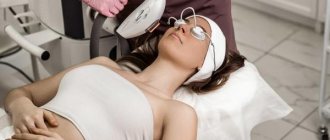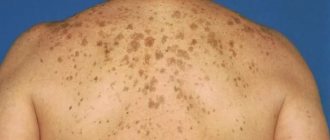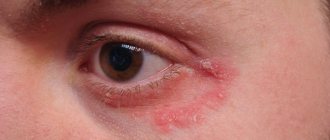What do the intestines and skin have in common? In fact, there is more than it might seem. Both organs are home to amazing flora. The large intestine, containing approximately one billion microorganisms per gram of intestinal wall, is one of the most densely populated places in the world.
On the surface of our skin, life is also seething: in two square meters there are approximately the same number of microbes as there are people on Earth. Upon closer inspection, it is not surprising that there is a close relationship between these two organs and their extensive microflora. How does it work and how much does skin health depend on the condition of the intestines?
Free webinars on anti-aging medicine Learn about the features of the Anti-Age Expert International School, as well as the opportunities for improving your medical practice every day.
The webinar program also includes fascinating reviews of innovations in anti-aging medicine and analyzes of the most complex clinical cases with recommendations that really work. Find out more
The gut-skin connection
Good skin is a sign of a healthy gut, and there is a scientific explanation for this.
The skin and intestines are not only the human organs with the largest surface area and densest microbial populations, they also develop from the same embryonic layer. These two organs, with their extensive networks of nerves and blood vessels, are also connected through the immune system.
It is likely that the immune system plays a special role in setting up the connection between the intestines and the skin. The intestinal flora, which weighs a total of one to two kilograms, “pulls the strings”, constantly interacting with immune cells to trigger the production of antibodies. It strengthens the immune system, benefiting both the skin and intestines.
The gut flora is in some ways a powerful chemical laboratory that produces many different substances, including key materials for skin health such as hyaluronic acid and biotin, in addition to substances that support the gut's ability to digest and process food. Ultimately, it is this “cocktail” of substances in the intestines that affects the nervous system, which, among other things, affects blood circulation in the skin.
Skin problems - intestinal problems
Besides the natural, genetically determined process of skin aging, there are other factors that can create additional problems for our skin. These include excessive sun exposure, certain medications, or poor skin care practices. An unhealthy lifestyle also leaves its mark on the skin - alcohol, nicotine, lack of sleep, stress, dehydration and, last but not least, poor nutrition can all negatively impact your appearance.
When the intestines are in trouble, the skin suffers along with it. This relationship has been the focus of several studies, which show that people with dermatological problems often have abnormal intestinal flora (eg, insufficient numbers of lactobacilli and bifidobacteria) or intestinal wall permeability.
“Impairments in the intestines can provoke acne, allergic skin rashes, pigmentation and other problems. How the skin will react depends on many factors: genetic predisposition, constitutional characteristics of the body, lifestyle. Where it's thin, that's where it breaks! It is important to understand that the skin is the same organ as the heart and stomach; it can also hurt and need treatment. In addition, there is a group of foods whose irrational consumption affects the condition of the skin. Thus, excessive consumption of carbohydrates and refined foods can lead to active fermentation processes in the intestines, which is why nutrients are poorly absorbed, and toxins and rotting products are well absorbed. This is why even the most expensive cream will not help our skin if the cause of rashes and pigmentation is internal.”
Olga Aleksandrovna Belobabova
cosmetologist, dermatologist, laser therapist, anti-aging medicine specialist
Experience: 18 years
One of the most striking examples of the relationship between a skin condition and the gut is psoriasis, where the body attempts to eliminate toxins by filtering them through the intestinal wall. This pathology is caused by the so-called leaky gut syndrome.
Various studies have concluded that patients suffering from Crohn's disease and ulcerative colitis experience skin changes.
People with gluten allergies may also have skin problems. These manifestations are not regular, but may cause concern in the long term.
Disturbances in the intestinal flora can be aggravated by stress.
Also, the diversity of intestinal bacteria can be reduced by medications (antibiotics or laxatives), as well as an unhealthy diet that lacks essential nutrients. Research has shown that the guts of tribal populations contain more diverse microbial species than industrialized populations, whose diets and lifestyles contribute to the loss of 40% of this diversity. This decline also affects the ability of gut flora to extract nutrients from food and protect us from toxins. This eventually shows up on our skin due to the connection described above.
Online training in Anti-Age medicine Learn the intricacies of anti-aging medicine from anywhere in the world.
For the convenience of doctors, we have created the Anti-Age Expert online training platform: Lectures from our educational programs are consistently posted here, and are accessible 24/7. Doctors can study the materials as many times as necessary, ask questions and discuss interesting clinical cases with colleagues in special chats. Find out more
How to check your intestines?
Colonoscopy is an informative, but unpleasant and painful procedure that not everyone decides to undergo. In addition, it has a number of contraindications: inflammation of the peritoneum, intestinal ischemia, tumors, acute cardiovascular failure, etc.
But there is a safe and painless alternative to colonoscopy - an MRI of the intestine. During the procedure, the patient does not experience pain, he does not need to overcome a psychological barrier.
The sensations of magnetic resonance therapy can be compared to conventional radiography. The only difference is the duration of the procedure. An MRI lasts, on average, 15-40 minutes (depending on the scope of research and the device), and x-rays are done instantly.
Nutrition for gut health and beautiful skin
If you struggle with problematic skin, be sure to take care of your digestive tract. To support beneficial gut microbes, especially lactobacilli and bifidobacteria, you need to provide them with the right fuel. These bacteria love to feed on soluble fiber, which is especially abundant in plant-based foods. Some bitter herbs, such as milk thistle and artichokes, are also very beneficial for the gut. They help stimulate the liver and gallbladder, supporting the digestive process in the intestines.
To maintain a radiant appearance, it is important to understand which foods the intestines and intestinal bacteria do not like.
This “black list” can include:
- low fiber foods;
- large amounts of sugar;
- lots of unhealthy fats;
- high protein content;
- alcohol;
- food additives (found in highly processed foods such as ready meals, sauces, etc.);
- certain medications (antibiotics, laxatives, birth control, hormonal supplements, etc.)
At the same time, the intestines and intestinal bacteria love:
- soluble fiber from fruits, vegetables, legumes and whole grains;
- bitter plants such as milk thistle and artichokes;
- fermented foods such as sauerkraut;
- for healthy mucous membranes: vitamins A, B2, niacin, biotin;
- sufficient amount of liquid (water or unsweetened herbal tea);
- steaming or slow cooking to retain maximum nutrients;
- proper chewing;
- eating in a peaceful and quiet atmosphere.
This “demanding” intestines can be easily satisfied by adjusting your diet and developing healthy eating habits.
How to help your skin and intestines
Due to their particularly active metabolism, both skin cells and intestinal mucosal cells require a good supply of nutrients. Make sure you're consuming enough of the right vitamins to keep both of these barrier organs in good condition for as long as possible: vitamins A, B2, niacin and biotin work to keep your mucous membranes healthy. Meanwhile, vitamins C, E and biotin benefit the skin from the inside out.
Thus, ascorbic acid supports the production of collagen - an important component of connective tissue - for the normal functioning of the skin. Vitamin C and vitamin E also work together to protect cells from oxidative stress, which can be caused by, among other things, ultraviolet rays.
Other ways to help your skin:
- Water.
This is the “secret weapon” for beautiful skin. A study from the Berlin Charité hospital confirms the restorative effect of water on our internal organs: people who drink water have healthier skin. Drinking water improves blood circulation in the skin in just ten minutes: the skin receives more oxygen, metabolism accelerates and its key functions are supported. In the long term, water revitalizes the skin from the inside out and makes it noticeably fresher.
- Quality sleep.
Night is the time when skin cells focus on regeneration. A good night's sleep pays off with a beautiful complexion. On the other hand, insufficient sleep leads to pale skin and dark circles under the eyes.
- Fresh air.
It is good not only for the soul. A long walk in the fresh air provides the body with the necessary oxygen. Oxygen is absorbed by the lungs and partially by the skin. Frequent walks will make your complexion glow.
- More probiotics.
Acidophilus, bifidophyllus and other bacteria are important for the health of the intestines, and therefore the skin. However, oral probiotics help reduce skin inflammation.
Fermented foods such as yogurt, kefir, sauerkraut, tofu, and kombucha are rich in probiotics. If you want to promote the growth of beneficial gut bacteria, add them to your daily diet.
- Reduced stress levels.
Avoid stress for optimal bowel function and beautiful skin. It affects every system in the body, and stress hormones such as adrenaline and cortisol can wreak havoc on the skin.
To reduce your stress levels, try mindfulness exercises. For example, daily meditation sessions may work.
Anti-aging medicine for skin treatment
To solve skin problems and detoxify the skin, you should not limit yourself to the superficial aspects. It is important to treat our entire body functionally using integrative medicine, which thus covers all the vital processes in our body.
Anti-age doctors have the necessary knowledge - they will help detect dysfunctions of the interconnected systems of our body. Anti-aging medicine is used, among other things, to treat many skin diseases of various origins. It is also effective, for example, in inflammatory diseases that affect our immune system.
Anti-age medicine focuses on an individualized approach to treatment.
Treatment of skin diseases does not work? Check your intestines!
Experienced dermatologists know that to look for the cause of acne, eczema, and peeling skin, you need to start looking from the intestines. Trying to fight the consequences of gastrointestinal pathologies is useless. Therefore, ointments, creams and lotions will not help.
Tormented by skin problems? Take a little time and go through the diagnostics. The price of an MRI of the intestine is much lower than the cost of treating skin diseases in dermatological clinics and beauty salons.
The right diet, medications to normalize intestinal function and physical activity will help quickly solve the problem. Swimming, yoga and aerobic exercise are best for this purpose.
Brief conclusions
- The skin and gut are connected through the immune system;
- Irregularities in the intestines can provoke acne, allergic skin rashes, pigmentation and other problems;
- You can improve your intestinal health by following a certain diet and giving up certain foods;
- “Correct” life hygiene can improve the condition of the skin and intestines;
- The corresponding problems can also be corrected with the help of anti-aging medicine.
Anti-Aging Medicine Seminars Gain knowledge based on evidence-based medicine first-hand from the world's leading experts. As part of the Anti-Age Expert Modular School, in-person two-day seminars are held every month, where the intricacies of anti-age medicine are revealed to doctors of more than 25 specialties
Find out more
How to perform a colon cleansing procedure
The method is technically simple, does not require special equipment and is as follows: the patient drinks a solution of 150-200 ml at intervals of 5-10 minutes.
After 0.5-1.5 hours, the intestines begin to empty naturally, gently, without effort or discomfort. The procedure is carried out until the wash water is clean. Soon after the patient stops drinking the solution, the “work” of the intestines stops. The entire procedure lasts 2-4 hours, after which the patient can carry out normal activities. To thoroughly cleanse the body, 2 procedures with an interval of 2-3 days are enough. In the presence of any diseases, treatment is carried out until the clinical effect (improvement, recovery) is achieved in the form of a course of intestinal lavage, which consists of several procedures.











